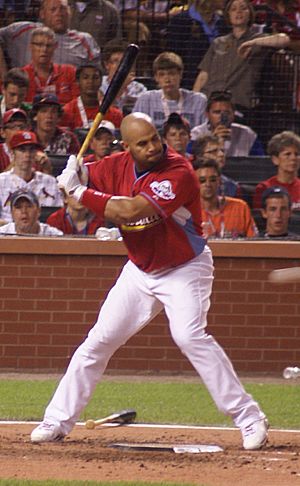Major League Baseball Most Valuable Player Award facts for kids
Quick facts for kids Major League Baseball Most Valuable Player Award (MVP) |
|
|---|---|
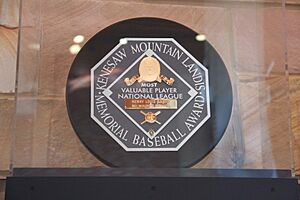
The Most Valuable Player Award given to Hank Aaron in 1957
|
|
| Sport | Baseball |
| League | Major League Baseball |
| Given for | Regular season most valuable player of American League and National League |
| Country | United States, Canada |
| Presented by | Baseball Writers' Association of America |
| History | |
| First award | 1931 |
| Most recent | Ronald Acuña Jr. (NL) Shohei Ohtani (AL) |
The Major League Baseball Most Valuable Player Award (MVP) is a special yearly award in Major League Baseball (MLB). It's given to one amazing player in the American League and one in the National League. The Baseball Writers' Association of America (BBWAA) has given out this award since 1931.
Contents
History of the MVP Award
Since 1931, the Baseball Writers' Association of America (BBWAA) has chosen a Most Valuable Player for both the National League and the American League. Before 1931, there were other similar awards. These included the League Award (1922–1929) and the Chalmers Award (1911–1914). We'll learn more about these older awards later.
How MVP Voting Works
MVP voting happens before the baseball playoffs. But the winners aren't announced until after the World Series is over. The BBWAA started by having three writers from each league city vote in 1938. This number was changed to two writers per city in 1961.
The BBWAA doesn't have a super strict rule for what "most valuable" means. This lets each voter decide who they think is the best and most important player.
Award Name Change
In 1944, the award was named after Kenesaw Mountain Landis. He was the very first Commissioner of Baseball. His name used to be on the award plaque given to winners.
However, starting in 2020, Landis's name was removed from the MVP plaque. This happened after some former MVP winners complained about Landis's actions against allowing all players to join MLB, regardless of their background.
Who Wins the MVP?
Players who play first base have won the most MVP awards among infielders, with 35 winners. After them are second basemen (16), third basemen (15), and shortstops (15).
Out of 25 pitchers who have won the award, 15 throw with their right hand, and 10 throw with their left hand. Only three pitchers, Walter Johnson, Carl Hubbell, and Hal Newhouser, have won the award more than once. Hal Newhouser won it two years in a row in 1944 and 1945.
Some players have won the MVP award while playing different positions. These include Hank Greenberg, Stan Musial, Alex Rodriguez, and Robin Yount. Alex Rodriguez is the only player to win the award with two different teams and at two different positions.
Andre Dawson and Alex Rodriguez are the only players to win the MVP while playing for a team that finished in last place. Barry Bonds has won the award the most times, with seven wins. He also won it four times in a row from 2001 to 2004.
Jimmie Foxx was the first player to win the award more than once. Ten players have won it three times, and 19 players have won it twice. Frank Robinson is the only player to win the MVP award in both the American and National Leagues.
Special MVP Moments
The award has only had one tie. This happened in the National League in 1979, when Keith Hernandez and Willie Stargell got the same number of points.
Nineteen players have been "unanimous winners." This means they received every single first-place vote. The New York Yankees have had the most MVP winners, with 23 players. The St. Louis Cardinals are second with 21 winners. Three teams have never had an MVP winner: the Arizona Diamondbacks, New York Mets, and Tampa Bay Rays.
In recent years, pitchers haven't won the MVP award very often. When Shohei Ohtani won the American League award in 2021, he was the first pitcher in either league to win MVP since Clayton Kershaw in 2014. He was also the first in the American League since Justin Verlander in 2011.
Shohei Ohtani is also special because he's the first two-way player (someone who both pitches and hits really well) to win the award. In 2023, he became the first player in MLB history to win MVP by a unanimous vote twice!
Interestingly, no MVP award was given in 1930. This means one of the greatest performances ever, by Hack Wilson of the Chicago Cubs, went without an award. He set an MLB record for RBI (runs batted in) with 191, which still stands today. He also hit .356 and set a National League record with 56 home runs.
Key to the Tables
| Year | Shows the year of the Major League Baseball season. |
|---|---|
| Means the player is in the National Baseball Hall of Fame. | |
| ^ | Means the player is still playing baseball. |
| § | Means the player was a "unanimous selection" (got all first-place votes). |
| Player (X) | Shows the winning player's name and how many times they had won the award by that point. |
| * | Means the player's team won their league's championship (pennant) that year. |
| P | Pitcher (RHP means right-handed pitcher; LHP means left-handed pitcher). |
| C | Catcher. |
| 1B | First baseman. |
| 2B | Second baseman. |
| 3B | Third baseman. |
| SS | Shortstop. |
| OF | Outfielder. |
| DH | Designated hitter. |
Early Baseball Awards: The Chalmers Award (1911–1914)
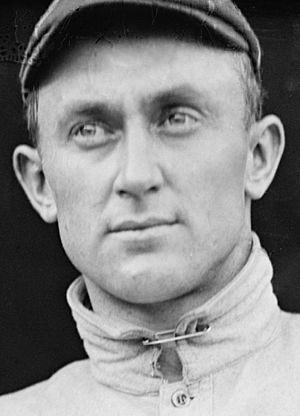
Before the 1910 baseball season, a car company owner named Hugh Chalmers made a promise. He said he would give a new Chalmers Model 30 car to the player with the best batting average in MLB.
In 1910, the race for the best batting average in the American League was very close. It was between Detroit Tigers star Ty Cobb and Nap Lajoie of the Cleveland Indians. On the very last day of the season, Lajoie seemed to pass Cobb's average. He got seven special "bunt" hits against the St. Louis Browns.
But then, the American League President, Ban Johnson, said that after checking the numbers again, Cobb had actually won. In the end, Chalmers decided to give a car to both players!
Because of this, Chalmers created a new award for the next season. It was called the Chalmers Award. A group of baseball writers would decide who was the "most important and useful player" to their team and league. However, the award didn't help Chalmers sell as many cars as he hoped. So, it was stopped after the 1914 season.
| Year | American League winner | Team | Position | National League winner | Team | Position | Ref |
|---|---|---|---|---|---|---|---|
| 1911 | Ty Cobb |
Detroit Tigers | OF | Frank Schulte | Chicago Cubs | OF | |
| 1912 | Tris Speaker |
Boston Red Sox | OF | Larry Doyle | New York Giants | 2B | |
| 1913 | Walter Johnson |
Washington Senators | RHP | Jake Daubert | Brooklyn Superbas | 1B | |
| 1914 | Eddie Collins |
Philadelphia Athletics | 2B | Johnny Evers |
Boston Braves | 2B |
League Awards (1922–1929)
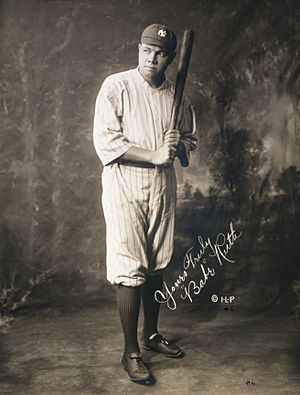
In 1922, the American League started a new award. It was meant to honor "the baseball player who is of the greatest all-around service to his club." Winners received a bronze medal and money.
There were some interesting rules for this award. Voters had to pick one player from each team. Also, players who were coaches and players who had won the award before could not win again. Because of these rules, famous player Babe Ruth only won this MVP award once before it was stopped in 1928.
The National League also had its own award from 1924 to 1929, but it didn't have these strict rules.
| Year | American League winner | Team | Position | National League winner | Team | Position | Ref |
|---|---|---|---|---|---|---|---|
| 1922 | George Sisler |
St. Louis Browns | 1B | — | — | — | |
| 1923 | Babe Ruth |
New York Yankees | OF | — | — | — | |
| 1924 | Walter Johnson |
Washington Senators | RHP | Dazzy Vance |
Brooklyn Robins | RHP | |
| 1925 | Roger Peckinpaugh | Washington Senators | SS | Rogers Hornsby |
St. Louis Cardinals | 2B | |
| 1926 | George Burns | Cleveland Indians | 1B | Bob O'Farrell | St. Louis Cardinals | C | |
| 1927 | Lou Gehrig |
New York Yankees | 1B | Paul Waner |
Pittsburgh Pirates | OF | |
| 1928 | Mickey Cochrane |
Philadelphia Athletics | C | Jim Bottomley |
St. Louis Cardinals | 1B | |
| 1929 | — | — | — | Rogers Hornsby |
Chicago Cubs | 2B |
The Modern MVP: Baseball Writers' Association of America's Most Valuable Player (1931–Present)
The modern MVP award, given by the BBWAA, started after the 1931 season. It used a voting system similar to the National League's earlier award.
One writer from each city with a team would vote. They would pick ten players, giving 10 points for their first choice, 9 for their second, and so on. In 1938, the number of voters increased to three per city, and the first-place vote was worth 14 points. The only big change since then happened in 1961, when the number of voters went back down to two per city.
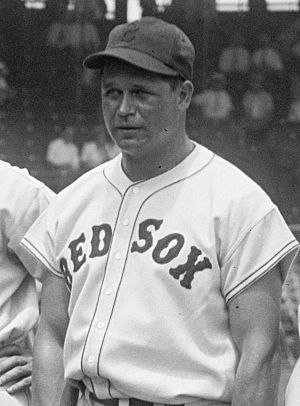

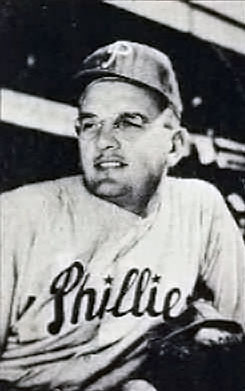
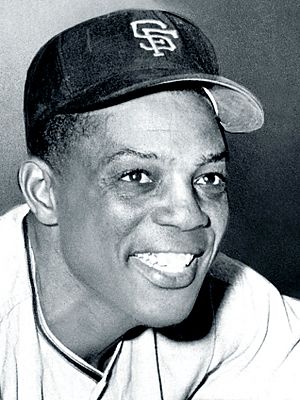
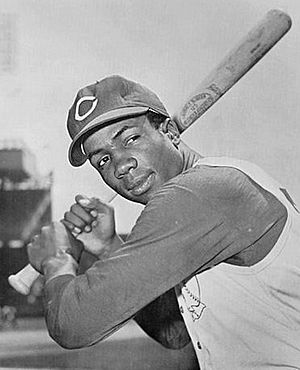
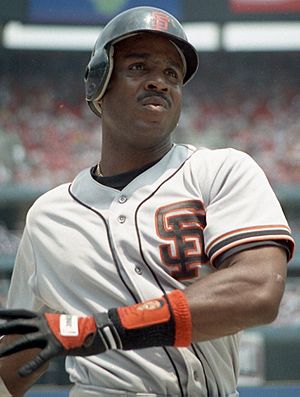
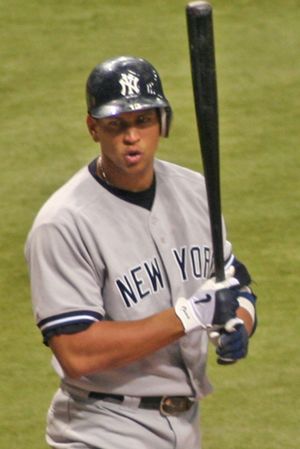
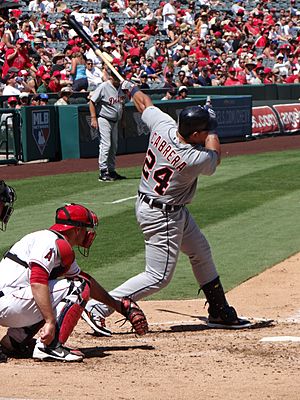
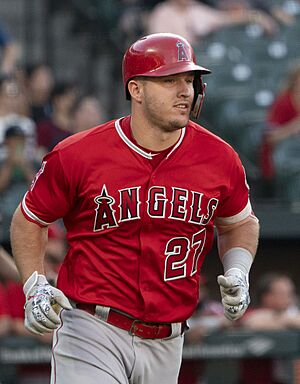
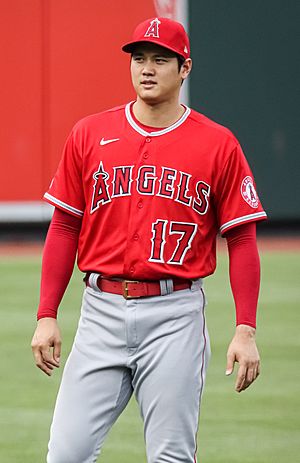
MVP Wins by Team
This table shows which teams have had the most MVP winners over the years.
| Teams | Awards | Years |
|---|---|---|
| New York Yankees | 23 | 1923, 1927, 1936, 1939, 1941–1943, 1947, 1950, 1951, 1954–1957, 1960–1963, 1976, 1985, 2005, 2007, 2022 |
| St. Louis Cardinals | 21 | 1925, 1926, 1928, 1931, 1934, 1937, 1942–1944, 1946, 1948, 1964, 1967, 1968, 1971, 1979, 1985, 2005, 2008, 2009, 2022 |
| New York/San Francisco Giants | 14 | 1912, 1933, 1936, 1954, 1965, 1969, 1989, 1993, 2000–2004, 2012 |
| Brooklyn/Los Angeles Dodgers | 1913, 1924, 1941, 1949, 1951, 1953, 1955, 1956, 1962, 1963, 1974, 1988, 2014, 2019 | |
| Philadelphia/Oakland Athletics | 13 | 1914, 1928, 1931–1933, 1952, 1971, 1973, 1988, 1990, 1992, 2000, 2002 |
| Cincinnati Reds | 12 | 1938–1940, 1961, 1970, 1972, 1973, 1975–1977, 1995, 2010 |
| Detroit Tigers | 1911, 1934, 1935, 1937, 1940, 1944, 1945, 1968, 1984, 2011–2013 | |
| Boston Red Sox | 1912, 1938, 1946, 1949, 1958, 1967, 1975, 1978, 1986, 1995, 2008, 2018 | |
| Chicago Cubs | 11 | 1911, 1929, 1935, 1945, 1952, 1958, 1959, 1984, 1987, 1998, 2016 |
| Boston/Milwaukee/Atlanta Braves | 9 | 1914, 1947, 1957, 1982, 1983, 1991, 1999, 2020, 2023 |
| Washington Senators/Minnesota Twins | 8 | 1913, 1924, 1925, 1965, 1969, 1977, 2006, 2009 |
| Pittsburgh Pirates | 1927, 1960, 1966, 1978, 1979, 1990, 1992, 2013 | |
| Philadelphia Phillies | 1932, 1950, 1980, 1981, 1986, 2006, 2007, 2021 | |
| California/Anaheim/Los Angeles Angels | 7 | 1979, 2004, 2014, 2016, 2019, 2021, 2023 |
| Baltimore Orioles/St. Louis Browns | 6 | 1922, 1964, 1966, 1970, 1983, 1991 |
| Texas Rangers | 1974, 1996, 1998, 1999, 2003, 2010 | |
| Milwaukee Brewers | 5 | 1981, 1982, 1989, 2011, 2018 |
| Chicago White Sox | 1959, 1972, 1993, 1994, 2020 | |
| Cleveland Indians / Guardians | 3 | 1926, 1948, 1953 |
| Seattle Mariners | 2 | 1997, 2001 |
| Toronto Blue Jays | 1987, 2015 | |
| Houston Astros | 1994, 2017 | |
| Kansas City Royals | 1 | 1980 |
| San Diego Padres | 1996 | |
| Colorado Rockies | 1997 | |
| Washington Nationals | 2015 | |
| Miami Marlins | 2017 | |
| Arizona Diamondbacks | 0 | none |
| New York Mets | none | |
| Tampa Bay Rays | none |
See also
 In Spanish: MVP de las Grandes Ligas de Béisbol para niños
In Spanish: MVP de las Grandes Ligas de Béisbol para niños
- "Esurance MLB Awards" Best Major Leaguer (in MLB; all positions) (there are also Best Hitter and Best Pitcher awards (in MLB))
- "Players Choice Awards" Player of the Year (in MLB; all positions) (there are also Outstanding Player and Outstanding Pitcher awards (in each league))
- Baseball America Major League Player of the Year (in MLB; all positions)
- Baseball Digest Player of the Year (in MLB; position players only; from 1969 to 1993, included all positions; in 1994, a separate Pitcher of the Year award was added)
- Best Major League Baseball Player ESPY Award (in MLB; all positions)
- The Sporting News Most Valuable Player Award (in each league) (discontinued in 1946)
- Sporting News Player of the Year (in MLB; position players only)
- List of Major League Baseball awards
- Baseball awards


